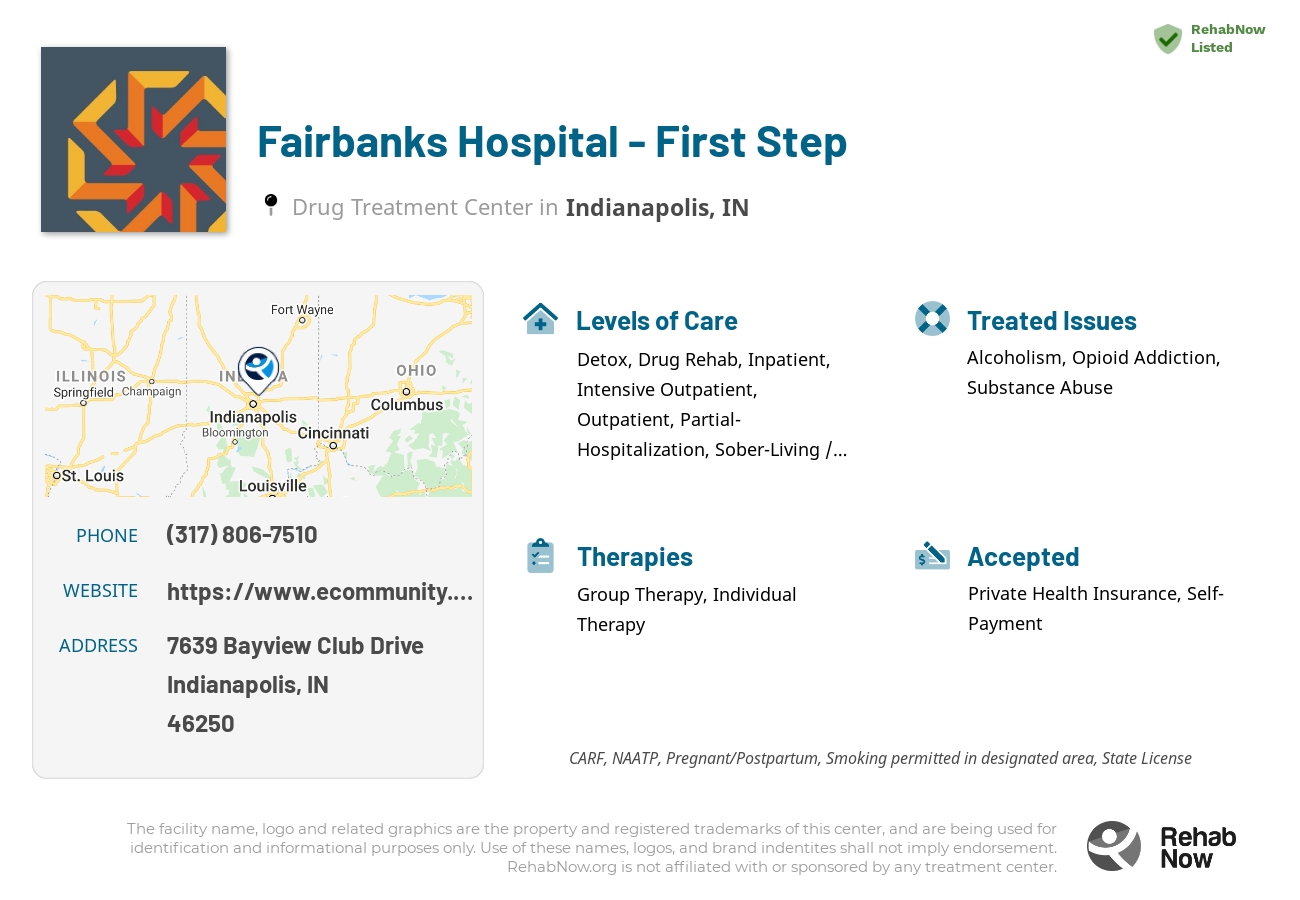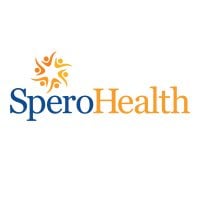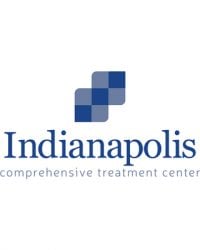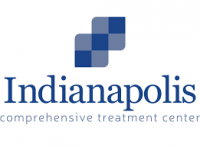Fairbanks Hospital - First Step
Drug Rehab Center in Indianapolis, Indiana
Fairbanks Hospital - First Step is an Indiana-based addiction treatment facility that provides comprehensive treatment plans, supervision, and therapies to help individuals suffering from alcoholism, opioid addiction, substance abuse, and drug addiction achieve sobriety.
Multiple patients have reported Fairbanks Hospital - First Step as permanently closed.
Research other rehabs in Indianapolis, Indiana, or get help finding an open facility.
About This Indiana Facility
Fairbanks Hospital - First Step is a leading addiction treatment facility located in Indianapolis, Indiana. This facility specializes in providing comprehensive care for individuals suffering from alcoholism, opioid addiction, substance abuse, and drug addiction. With a strong focus on personalized treatment plans, Fairbanks Hospital - First Step offers a range of levels of care to meet the unique needs of each individual. These include detoxification, inpatient rehabilitation, intensive outpatient programs, outpatient services, partial-hospitalization, sober-living/halfway houses, and residential treatment options. With a commitment to helping individuals achieve lasting sobriety, Fairbanks Hospital - First Step accepts private health insurance and is affiliated with Community Health Network, ensuring access to high-quality care.
Fairbanks Hospital - First Step offers a wide range of services and treatment methods to address addiction and substance abuse. Their detoxification program provides a safe and supportive environment for individuals to undergo withdrawal and receive medical assistance to manage symptoms. Inpatient rehabilitation offers a structured and supervised setting, providing intensive therapy, counseling, and support to help individuals overcome addiction. The facility also offers intensive outpatient programs, allowing individuals to receive treatment while maintaining their daily responsibilities. Outpatient services provide ongoing support and therapy for individuals looking to maintain their sobriety. Additionally, Fairbanks Hospital - First Step offers partial-hospitalization programs, which offer a higher level of care than outpatient treatment while allowing individuals to return home at night. The facility also provides sober-living/halfway houses for individuals transitioning back into society after completing a treatment program. With a focus on evidence-based approaches and individualized care, Fairbanks Hospital - First Step is dedicated to helping individuals achieve and maintain sobriety.
Genders
Ages
Modality
Additional
Conditions and Issues Treated
Substance Abuse Treatment is important when getting sober, as it helps addicts learn the skills they need to live a clean life. There are many different kinds of recovery treatment, including medication-assisted therapy, behavioral therapeutic approaches and self-help groups, as well as counseling.
Opioid abuse has become a national epidemic in the last decade. The US has one of the world’s highest rates of opioid use and abuse, as well as opioid-related deaths. Opioids are classified as Schedule II-IV controlled substances in the US due to their high potential for abuse.
Oxycodone, hydrocodone, methadone, and fentanyl are the most common Opioids and are commonly prescribed to treat pain. Tolerance to opioids develops over time, making life difficult, if not impossible, without them. Opioid users often obtain the drugs illegally. They can be drug dealers, friends, or family members who do not have valid prescriptions.
The desire for a more intense high than prescription opioids can quickly lead to heroin use. Heroin users are more prone to illness and death due to the high risk of overdose.
Many opioid addicts who seek treatment believe that the only way to overcome their addiction is through medical detox and long-term drug addiction rehab. To help patients wean off their addiction and reduce the risk of overdose, medication-assisted therapy (MAT) involves prescribing a replacement opioid. Doctors use MAT in conjunction with other anti-craving medications to help patients maintain recovery. Due to the high risk of relapse, MAT is often combined with individual and group counseling and social support programs.
Levels of Care Offered at Fairbanks Hospital - First Step
This center offers a variety of custom treatment tailored to individual recovery. Currently available are Detox, Drug Rehab, Inpatient, Intensive Outpatient, Outpatient, Partial-Hospitalization, Residential, Sober-Living / Half-Way, with additional therapies available as listed below.
The detoxification process typically includes some combination of the following: medical supervision, medication to help alleviate withdrawal symptoms, drug testing to monitor progress, and counseling.
Tackling the physical symptoms of withdrawal is essential to ensure that an individual can focus on the psychological aspects of the addiction without focusing on the physical pain that comes with withdrawal.
Withdrawal symptoms can be uncomfortable, even life-threatening, so carefully managing the detox process is extremely important. In many cases, more advanced pharmaceutical interventions are used to treat more severe withdrawal symptoms. Medication might help alleviate discomfort associated with detox, including nausea and headaches.
Inpatient treatment centers offer a safe, secure, and often medically supervised environment for drug or alcohol-addicted individuals. Many of these facilities are equipped to provide detoxification, treatment for co-occurring mental health disorders, and aftercare programs. The patient typically spends 28 to 30 days at the facility and will receive extensive drug counseling.
Intensive outpatient treatment is a form of addiction care that allows patients to continue living at home while undergoing treatment. This type of care is appropriate for patients who have been treated in residential treatment programs. Intensive outpatient programs include regular visits to the facility providing therapy, and patients gradually return to their routine life. IOP benefits most when patients have a supportive family member or friend to help them recover.
The first step to getting into an intensive outpatient program is to attend a detoxification facility. Detoxification facilities are designed to remove substances from the body safely. The patient will attend sessions designed to help them understand their addiction and its impact on their lives. While in an intensive outpatient program, therapy sessions are scheduled three to five times per week, with the patient attending no more than two sessions in one day.
An outpatient treatment program is set up to help with alcohol or drug addiction or a co-occurring disorder. The patient must attend the facility for their therapy and other programs but can return home each night.
The frequency of mandatory attendance decreases after much of Fairbanks Hospital - First Step‘s program is complete.
Outpatient treatment is a recovery approach that allows recovering addicts to live at home while getting rehab for addiction
An outpatient can include day treatments which include attending group sessions one hour per week. A person living in an outpatient environment may be allowed the opportunity to work full time if they choose to and continue studies without interruption from drugs/alcohol.
Outpatient treatment is an option for people who want to maintain their careers and families. Outpatients live at home but attend treatment such as individual counseling, group counseling, or twelve-step meetings during the day.
PHP is another way to receive a significant amount of treatment while decreasing the time commitment and cost. It involves counseling, group meetings, peer interaction, and many of the same benefits of inpatient treatment. This can be a good option for stepping down from inpatient treatment in anticipation of a fully independent life.
Sober Living Homes are used in drug rehab to help former addicts maintain sobriety. The residents are provided with a safe and supportive environment to learn how to live a sober life. They also provide them with opportunities for exercise, many of which encourage learning coping mechanisms that will be helpful later on.
Residential treatment programs are those that offer housing and meals in addition to substance abuse treatment. Rehab facilities that offer residential treatment allow patients to focus solely on recovery, in an environment totally separate from their lives. Some rehab centers specialize in short-term residential treatment (a few days to a week or two), while others solely provide treatment on a long-term basis (several weeks to months). Some offer both, and tailor treatment to the patient’s individual requirements.
Therapies & Programs
At Fairbanks Hospital - First Step , to learn from past mistakes and improve one’s situation, the recovering person meets individually with a therapist. The counselor or therapist will address addiction causes, triggers, mental issues, dual diagnosis, and aftercare plans during this time. This is a very intense and challenging process. Some clients find it easier to open up to someone other than family or friends who understand their struggles with addiction.
In group therapy, recovering addicts meet with a therapist and other people in recovery. Some groups are closed, meaning only people who share the same addiction or problem can attend. Others are open to anyone who wants to stop using drugs or drinking alcohol. Group therapy sessions typically focus on one topic each week or month so that recovering addicts can discuss issues they face daily.
Payment Options Accepted
For specific insurance or payment methods please contact us.
Is your insurance accepted?
Ask an expert, call (888) 674-0062
Community Health Network Associated Centers
Discover treatment facilities under the same provider.
- Community Health Network - Behavioral Health Services in Indianapolis, IN
- Fairbanks Hospital - Indianapolis in Indianapolis, IN
- Community Howard Behavioral Health Services in Kokomo, IN
- Community Hospitals - Crestview Center in Anderson, IN
- Gallahue Mental Health Services in Greenfield, IN
Learn More About Community Health Network Centers
Additional Details
Specifics, location, and helpful extra information.
Indianapolis, Indiana 46250 Phone Number(317) 806-7510 Meta DetailsUpdated November 25, 2023
Staff Verified
Patient Reviews
There are no reviews yet. Be the first one to write one.
Indianapolis, Indiana Addiction Information
The state of Indiana ranks 14th in the nation for drug abuse, but 17th for drug overdoses. The state has many high-quality rehabilitation centers, but reports show that there are about 20 deaths per 100,000 people. This is due to its location making it a drug trafficking haven, where many drugs are further distributed into the country.
The drug addiction problem in Indianapolis, Indiana, is quite severe. There were over 1,600 overdose deaths in Indianapolis between 1999 and 2016. This means that, on average, there were about 100 overdose deaths per year in Indianapolis during that period. Rehab centers in Indianapolis, Indiana, offer a variety of programs, including inpatient and outpatient programs, 12-step programs, and faith-based programs.
Treatment in Nearby Cities
- Michigan City, IN ( mi.)
- Knox, IN (101.6 mi.)
- Edinburgh, IN (37.6 mi.)
- Plainfield, IN (22.7 mi.)
- Seymour, IN (65.2 mi.)
Centers near Fairbanks Hospital - First Step
The facility name, logo and brand are the property and registered trademarks of Fairbanks Hospital - First Step, and are being used for identification and informational purposes only. Use of these names, logos and brands shall not imply endorsement. RehabNow.org is not affiliated with or sponsored by Fairbanks Hospital - First Step.










